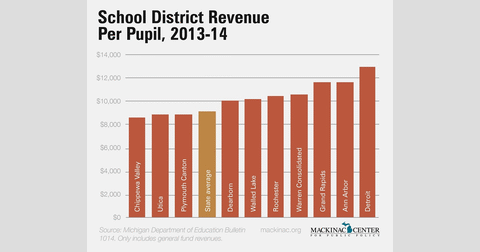Don't Blame Lack of Money for Deplorable Conditions in Detroit Schools
DPS is a top-spending district for operations and infrastructure
One rationale given by some Detroit teachers who have engaged in illegal strikes in the past several weeks is that they were protesting deplorable conditions in the schools. The strikes have closed schools and caused tens of thousands of students to miss classes.
The claims of poorly maintained schools have triggered media reports that students have to wear jackets in class because the heat doesn’t work, along with allegations of black mold contamination and a general state of disrepair.
Some teachers have said that DPS students deserve a level playing field, implying the state does not give as much money to Detroit as other school districts. This plays on a widespread perception that schools in poor communities get less money. This was a valid complaint before a 1994 school finance overhaul largely equalized funding across districts (Proposal A), but it cannot be sustained today.
In particular, the underfunding claim is not true in Detroit, whether it concerns funding for operations or for new buildings and major repairs (infrastructure).
As for the latter, in November 2009, Detroit voters approved $500.5 million in new debt (and related tax hikes on property owners) intended to improve the physical condition of the city’s schools. The magnitude of this spending is revealed by the fact that infrastructure millages approved in 35 other districts that year came to $583 million.
On the operations side, Detroit Public Schools received more money per pupil in the 2013-14 school year than any of the state’s 10 largest school districts. Detroit got $12,931 in local, state and federal funding for operations, compared to the statewide average of $9,121 (see attached chart). To cite just one comparison, that year Detroit received about $4,400 more per pupil than the Chippewa Valley School District ($8,549), which is just 30 miles away from Detroit.
Michigan Capitol Confidential is the news source produced by the Mackinac Center for Public Policy. Michigan Capitol Confidential reports with a free-market news perspective.


There’s something wrong with Union Township: Part 3